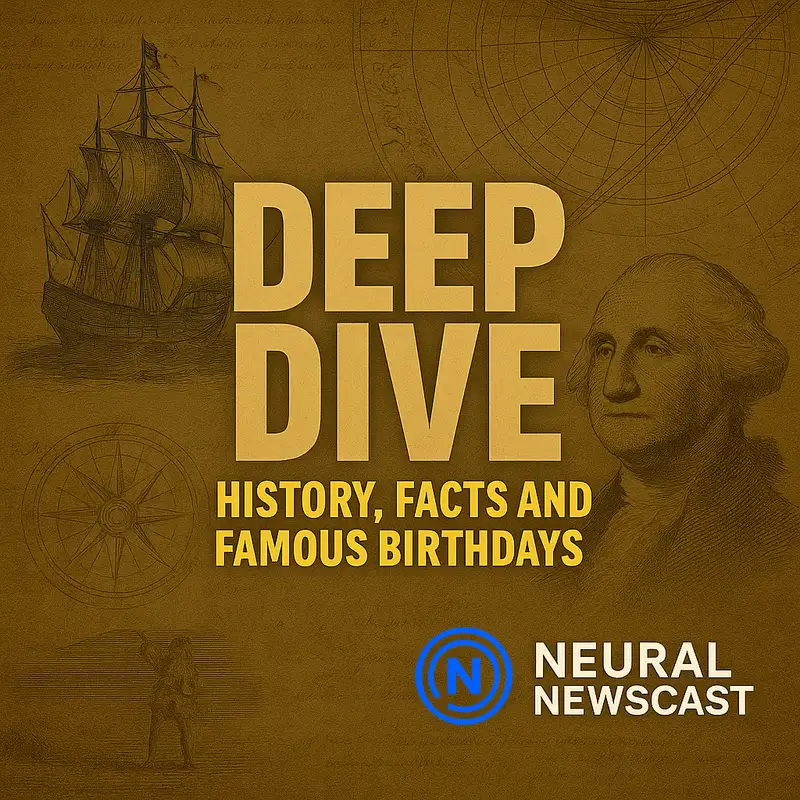Deep Dive: Gaffes, Great Voices, and a Wild Kingdom Bite: A Historical Deep Dive - November 3, 2025
From AI-generated insights to human-reviewed accuracy, this is Neural Newscast, keeping you informed every day.
Get ready for a deep dive from Neural Newscast.
I'm Miriam, your memorial specialist, and Sophia, your lifestyle correspondent, is here with
me as we delve into today's subjects.
On this day in 1948, a Chicago newspaper made a history-making mistake that became famous,
a gaffe still remembered for its impact on reporting and public perception.
It's striking how a single error can echo through time like that, Miriam.
A newspaper misstep in 1948 that didn't just embarrass an outlet, but reshaped how people
think about reporting inaccuracy.
Exactly, Sophia.
The moment became emblematic.
It wasn't just a typo or a small slip, but a gaff that carried weight, influencing trust
in the press and the standards journalists hold themselves to.
And from a lifestyle perspective, that kind of public reaction matters.
It alters everyday conversations about where we get our information and how we judge it, right?
Yes.
Memorializing that 1948 incident means acknowledging both the human fallibility behind reporting
and the institutional changes that followed as newsrooms reckoned with their responsibility
to readers.
I'm thinking about the ripple effects, how people adjusted their expectations, how families
discussed news differently in the years after.
A famous gaff like that becomes part of cultural memory.
It does. It also serves as a teaching moment within journalism,
a concrete example of what can happen when fact-checking or editorial judgment fails,
prompting procedural overhauls and ethical reflections.
Those conversations are so important for daily life.
for how people decide what to share,
how to talk about events at the dinner table,
even how we advise younger folks to evaluate media.
And because the mistake is from 1948 and so well remembered,
it gives historians and reporters a clear reference point
when tracing the evolution of media accountability.
Right, it anchors a narrative.
People can point to that specific 1948 error and say, this is when perceptions shifted, which makes the abstract idea of trust in media very tangible.
There's also a somber element to commemorating it, acknowledging the consequences and the lessons while honoring the public's right to accurate information.
And on a human level, it's a reminder that institutions are made of people who can err,
and that recovery, improving systems, and restoring trust is part of progress.
That balance between critique and learning is why the 1948 GAF remains part of memorial conversations about journalism,
a cautionary tale that still informs practice.
It also nudges us as consumers to stay engaged, to ask questions, and to value verification,
small habits that change everyday media consumption.
Ultimately, remembering that 1948 moment helps keep the standards of reporting alive,
making sure the next generation takes those lessons seriously.
It's a vivid piece of history with practical echoes for how we live and communicate now.
A gaff made famous, yes, but one that spurred lasting reflection.
Stay with us more deep dive exploring coming up.
Today we celebrate the birthdays of Vincenzo Bellini, 1801, Charles Bronson, 1921, and Anna Wintour, 1949.
Bellini stands out to me, lush melodies and belcanto, right?
I love how you called his work enchanting in the notes.
That really captures the feeling.
Exactly.
Vincenzo Bellini, born in 1801, is credited with revolutionizing the art of Belcanto.
Operas like Norma and La Senambula are touchstones for that style, prized for their lyrical lines
and emotional clarity.
Those names, Norma and La Sonambula, sound almost like characters you want to live inside.
There's a kind of intimacy in Belcanto that feels very human, very present.
Any lesser-known threads in his life?
He achieved remarkable maturity very young.
His melodic gift allowed singers to convey deep, often complicated emotion with what seems effortless phrasing,
and that focus on melody over sheer vocal fireworks influenced generations of composers and performers.
Music
That's fascinating. So his restraint became a form of power. It makes his music feel timeless, not trapped in a single era.
Precisely. His melodies have a way of lingering, which is why Bellini remains a figure worth honoring.
His operas still enter repertoires worldwide and continue to inspire both musicians and listeners.
And thinking practically, his emphasis on expressive line must be a gold mine for singers working on technique and interpretation today.
Less about bravado, more about storytelling.
Absolutely.
Singers and teachers often return to Bellini for lessons in musical phrasing and emotional truth.
His work is a masterclass in shaping a line that breathes like speech.
It's also interesting how his influence ripples into modern performance practice.
People still look to his scores for how to balance voice and orchestra, so the melody always remains central.
That balance is at the heart of his legacy.
Bellini taught us that simplicity, when crafted with genius, becomes timeless, and that lesson continues to shape musical life.
A beautiful reminder that artistry doesn't need to shout to be heard.
Sometimes the most enduring pieces are the ones that move you quietly.
Indeed, celebrating Bellini today is a chance to reflect on a composer whose exquisite melodies still speak across two centuries, reminding us of music's enduring power.
Time for a quick pause.
We'll explore more when Neural Newscast Deep Dive returns.
Hey there, this is Chad Thompson, founder of Neural Newscast.
If Neural Newscast helps you feel more informed, I invite you to explore more of what we do.
For all our shows, including deep dives and special reports, visit NeuralNewscast.com.
Welcome back to Neural Newscast Deep Dive.
Let's continue our exploration.
Lorne Green had one of his nipples bitten off by an alligator while he was host of Lorne Green's Wild Kingdom.
That image is startling and immediately brings to mind the physical risks hosts once faced on camera,
especially on a show like Lauren Green backquote S. Wild Kingdom.
It does.
And the detail that he had one of his nipples bitten off by an alligator is stark.
As a memorial correspondent, I think about how such moments become part of a public figure's legacy.
Exactly. It's one of those facts that changes how you remember someone's career,
because it ties a personal bodily injury directly to their work on the program.
The specificity matters, bitten off by an alligator while he was host of that very show.
It anchors the incident to both the person and the context of his professional life.
And it highlights the unpredictable nature of wildlife encounters on television,
reminding listeners that what we see as spectacle often carried real danger for the people involved.
There's also a dignity to acknowledging such facts plainly.
It respects the truth of an experience without sensationalizing it.
Right. Saying the fact as it is allows us to consider its implications, for safety, for on-screen risk, and for how audiences perceive those moments later.
For someone like Green, that moment becomes part of the narrative we use to remember him, his commitment to bringing wildlife into public view, even at personal cost.
It also makes me think about how lifestyle and wellness conversations intersect with occupational hazards.
Sometimes the risks are literal and physical, like in this case.
And as we reflect on that, it's important to hold the detail steady.
Lauren Green had one of his nipples bitten off by an alligator while he was host of Lauren Green's Wild Kingdom.
It's a concise, powerful fact that shapes our understanding of both the man and the period of television that produced such moments.
We hope you enjoyed this deep dive.
From Miriam and all of us at Neural Newscast, I'm Sophia.
Join us next time.
That's it for today's episode of Neural Newscast, where AI meets accountability.
Catch up on past episodes at neuralnewscast.com.
And don't forget to follow or subscribe on your favorite podcast app.
Neural Newscast fuses real and AI-generated voices for fast quality news.
AI creates humans review.
We aim for accuracy, but errors can happen.
Verify key details.
Learn more at ennewscast.com.
Creators and Guests


